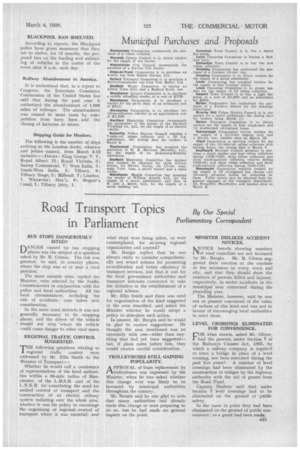Road Transport Topics By Our Special in Parliament Parliamentary Correspondent
Page 31

If you've noticed an error in this article please click here to report it so we can fix it.
BUS STOPS DANGEROUSLY SITED?
DANGER caused by bus stopping places was the subject of a question asked by Mr. R. Gibson, The risk was greatest, he said, in country places, where the stop was at or near a road junction.
The most suitable sites, replied the Minister, were, selected by the Traffic Commissioners in conjunction with the police and local authorities. All the local circumstances, including the risk of accidents, were taken into consideration.
In the more rural districts it was not generally necessary to fix stopping places, and the driver of the vehicle should not stop where his vehicle could cause danger to other road. users.
REGIONAL TRAFFIC CONTROL SUGGESTED.
following questions relating to rregional traffic control were addressed by Mr. Ellis Smith to the Minister of Transport:— Whether he would call a conference of representatives of the local authorities within a 50-mile radius of Manchester. of the L.M.S.R. and of the L.N.E.R. for considering the need for unified control of transport and the construction of an electric railway system radiating over the whole area; whethc:r it was his policy to encourage the organizing of regional control of transport where it was essential; and
what steps were being taken, or. were contemplated, for securing regional organization and control?
Mr. Burgin replied that he was always ready to consider sympathetically any sound scheme for promoting co-ordination and better efficiency in transport services, but that it was for the local government authorities and transport interests concerned to take the initiative in the establishment of a regional scheme.
Mr. Ellis Smith said there was need for organization of the kind suggested in the area described, and asked the Minister whether he would adopt a policy to stimulate such action. .
In answer, Mr. Burgin said he would be glad to receive suggestions. He thought the area mentioned was an extremely wide one—wider than anything that had yet been suggested— but, if plans came before him, they would receive careful consideration.
TROLLEYBUSES STILL GAINING POPULARITY.
APPROVAL of tram replacement by trolleybuses was expressed by the Minister, when he was asked whether this change over was likely to be favoured by municipal authorities throughout the country.
Mr. Burgin said he was glad to note that many authorities . had already made this change or were preparing to do so, but he had made no general inquiry on the point, MINISTER DISLIKES ACCIDENT • NOTICES.
NOTICE boards showing numbers of road casualties are not favoured by Mr. Burgin. Mr. IL Gibson suggested their erection at the roadside at the entrances to every town and city, and that they should show the numbers of persons killed and injured, respectively, in motor accidents in the municipal area concerned during the preceding year.
The Minister, however, said he was not at present convinced of the value of notices of this kind and was not in favour of encouraging local authorities to erect them.
LEVEL CROSSINGS ELIMINATED FOR CONVENIENCE.
FOR what reason, asked Mr. Oliver, had the powers, under Section 7 of the Railways Clauses Act, 1863, by which a railway company is required to erect a bridge in place of a level crossing, not been exercised during the past five years? A number of level crossings had been eliminated by the construction of bridges by the highway authority with the aid of grants from the Road Fund,
Captain Hudson said that under Section 7 level crossings had to be eliminated on the ground of public safety.
In the cases in point they had been eliminated on the ground of public convenience; so a grant had been made.




















































































